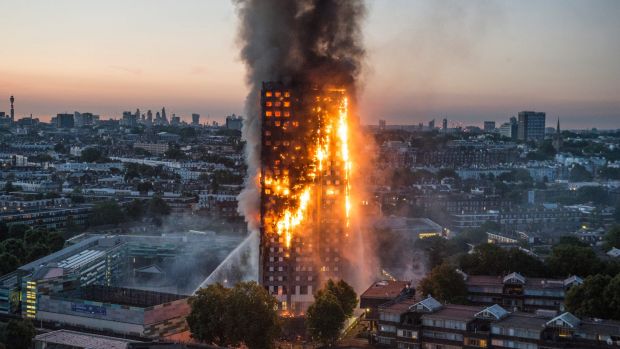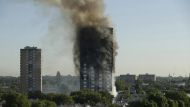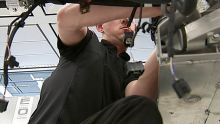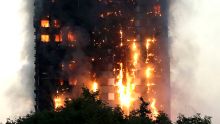The London tower devastated by a vicious building fire may have been installed with flammable cladding during a recent renovation.
Online records indicate contractor Harley Facades Limited installed "over-cladding with ACM cassette rainscreen" at Grenfell Tower.
More World News Videos
London Fire: 'It was like a horror movie'
Witnesses report seeing people trying to escape a massive fire engulfing a 24-storey apartment block in West London.
ACM stands for aluminium composite material, which is the same combustible product blamed for fuelling nearly a dozen major high-rise fires globally in the past decade, including in Melbourne in 2014.
One person was killed and another six people injured in Roubaix, France, in 2012 after Mermoz Tower was refurbished with flammable cladding.

14 May 2012: Mermoz Tower Fire in Roubaix, France. Rapid External Fire Spread/Dense Black Smoke ... #dubaifire #sfe pic.twitter.com/3a1Hyp57hK
ÔÇö SFE 2016 DUBLIN (@sfe2016dublin) January 15, 2016
There have also been dramatic tower fires linked to the aluminium panels with polyethylene core in the United Arab Emirates, South Korea and the United States.
Mark, 45, a witness to the Wednesday's London fire, said the Greenfell Tower had recently been renovated with cladding added to the outside. He believed the cladding caused the fire's intensity.
"It was burning like paper, it wasn't the building, it wasn't the structure. That cladding - it was just like throwing fuel on the fire." he said.
Another witness, Sam, 23, was returning to his home on a street nearby Latimer Road at 1am.
"The whole thing just went up, it took off like a match to paper," he told Fairfax Media.
"Whole panels were coming off in flames, their hoses could reach only halfway up the building, and whole bits of the facade from the top, these panels were literally falling down. It was horrible."
Veteran fire safety engineer Stephen Kip said combustible cladding could help a blaze spread up the facade of building, starting fires on many floors.
"All of the fire safety systems in buildings, like sprinklers, are in the inside, not the outside," Mr Kip said.
It is understood the external cladding upgrade at London's Grenfell Tower was part of a recent £8.6million ($14.5 million) refurbishment.
London-based developer Rydon completed the project, according to the company's website. Rydon director Andrew Goldman told ITV's Good Morning Britain: "We don't know there is any direct link between the fire and cladding."
A permit was granted for the refurbishment in early 2014.
Rydon issued a statement saying they were shocked to hear of the fire and their immediate thoughts were with those affected, their families, relatives and friends.
The refurbishment "met all required building control, fire regulation and health and safety standards", the firm said.
"We will cooperate with the relevant authorities and emergency services and fully support their inquiries into the causes of this fire at the appropriate time."
Fairfax Media has attempted to contact Harley Facades Limited for comment.
London Fire Brigade has confirmed a number of people have been killed in the blaze. It follows reports of residents waving mobile phones and cloth from their windows as apartments were engulfed in smoke and flames.
Flammable cladding has become a major issue in Australia following a fierce facade fire at the Lacrosse building in Docklands which the Metropolitan Fire Brigade said could have claimed lives under different weather conditions.

Fire spread up the facade of the Lacrosse tower in a matter of minutes. Photo: Gregory Badrock
But a number of building construction experts believe not enough has been done to address the widespread use of the cladding.
Mr Kip, an Adjunct Associate Professor with Victoria University, said he was still concerned that lives could be lost in a cladding fire in Melbourne.
"The buildings that I am seeing are very significantly non-compliant," he said.
The combustible material is still in place at the Lacrosse building, and could stay there until July 2018, despite an order to remove it.
With Nick Miller














